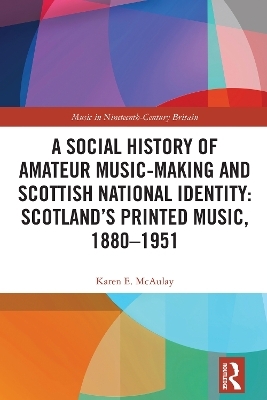
A Social History of Amateur Music-Making and Scottish National Identity: Scotland’s Printed Music, 1880–1951
Seiten
2024
Routledge (Verlag)
978-1-032-38920-2 (ISBN)
Routledge (Verlag)
978-1-032-38920-2 (ISBN)
Karen McAulay shows that the nature of the music, the song and fiddle tune books’ contents, the paratext around the collections, its packaging, marketing and dissemination all document the social history of an era whose everyday music has often been dismissed as not significant or indeed, properly ‘old’ enough to merit consideration.
Late Victorian Scotland had a flourishing music publishing trade, evidenced by the survival of a plethora of vocal scores and dance tune books; and whether informing us what people actually sang and played at home, danced to, or enjoyed in choirs, or reminding us of the impact of emigration from Britain for both emigrants and their families left behind, examining this neglected repertoire provides an insight into Scottish musical culture and is a valuable addition to the broader social history of Scotland.
The decline of the music trade by the mid-twentieth century is attributable to various factors, some external, but others due to the conservative and perhaps somewhat parochial nature of the publishers’ output. What survives bears witness to the importance of domestic and amateur music-making in ordinary lives between 1880 and 1950. Much of the music is now little more than a historical artefact. Nonetheless, Karen E. McAulay shows that the nature of the music, the song and fiddle tune books’ contents, the paratext around the collections, its packaging, marketing and dissemination all document the social history of an era whose everyday music has often been dismissed as not significant or, indeed, properly ‘old’ enough to merit consideration.
The book will be valuable for academics as well as folk musicians and those interested in the social and musical history of Scotland and the British Isles.
Late Victorian Scotland had a flourishing music publishing trade, evidenced by the survival of a plethora of vocal scores and dance tune books; and whether informing us what people actually sang and played at home, danced to, or enjoyed in choirs, or reminding us of the impact of emigration from Britain for both emigrants and their families left behind, examining this neglected repertoire provides an insight into Scottish musical culture and is a valuable addition to the broader social history of Scotland.
The decline of the music trade by the mid-twentieth century is attributable to various factors, some external, but others due to the conservative and perhaps somewhat parochial nature of the publishers’ output. What survives bears witness to the importance of domestic and amateur music-making in ordinary lives between 1880 and 1950. Much of the music is now little more than a historical artefact. Nonetheless, Karen E. McAulay shows that the nature of the music, the song and fiddle tune books’ contents, the paratext around the collections, its packaging, marketing and dissemination all document the social history of an era whose everyday music has often been dismissed as not significant or, indeed, properly ‘old’ enough to merit consideration.
The book will be valuable for academics as well as folk musicians and those interested in the social and musical history of Scotland and the British Isles.
Karen E. McAulay is a postdoctoral research fellow at the Royal Conservatoire of Scotland. Her book Our Ancient National Airs: Scottish Song Collecting from the Enlightenment to the Romantic Era was published by Ashgate in 2013. She has contributed chapters to Understanding Scotland Musically and Music by Subscription (2018, 2022, both Routledge).
Introduction
1 An Era of Opportunity for James S. Kerr and Mozart Allan
2 Nights Out Dancing and Evenings with the Children: Enduring Kerr and Mozart Allan Titles
3 The Saleability of Scottish (and Irish) Songs
4 Education, Preservation, Organisation
5 Expanding Horizons
6 Multimedia Technology, from Magic Lanterns to Recordings and Broadcasts
7 Publishing ‘Classical’ Music in Scotland
Conclusion
| Erscheinungsdatum | 11.09.2024 |
|---|---|
| Reihe/Serie | Music in Nineteenth-Century Britain |
| Zusatzinfo | 15 Tables, black and white |
| Verlagsort | London |
| Sprache | englisch |
| Maße | 156 x 234 mm |
| Gewicht | 570 g |
| Themenwelt | Kunst / Musik / Theater ► Musik ► Klassik / Oper / Musical |
| Geisteswissenschaften ► Geschichte ► Regional- / Ländergeschichte | |
| ISBN-10 | 1-032-38920-6 / 1032389206 |
| ISBN-13 | 978-1-032-38920-2 / 9781032389202 |
| Zustand | Neuware |
| Haben Sie eine Frage zum Produkt? |
Mehr entdecken
aus dem Bereich
aus dem Bereich


